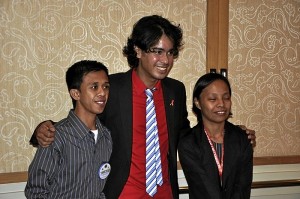
Ilonggo writer Wanggo Gallaga (center) is living life courageously as a new HIV prevention advocate. Bing Franco/CONTRIBUTOR
ILOILO CITY—He has slowed down his fast-paced lifestyle after he was found positive for human immunodeficiency virus (HIV), which causes Acquired Immune Deficiency Syndrome (AIDS), but Ilonggo writer Wanggo Gallaga noticed something since his affliction was discovered.
There is not much difference between persons with disabilities and those with HIV, he said. Both go through the same challenges and problems.
Gallaga cited concerns related to getting an education where both the disabled and the HIV-positive must adjust to certain medications that affect their mood and ability to learn.
Both also have to endure the stigma that comes with how people look at them and their situation, he added.
Yet, Gallaga said, persons with disabilities and with HIV can inspire those who are in hopeless situations.
“Our very lives, persons with disabilities and people with health problems give people encouragement to continue living because if we can do it, anybody can,” he told an audience of international development workers at the 2nd Asia-Pacific CBR (Community-based Rehabilitation) Congress on Nov. 29 in Manila.
Gallaga is the youngest of five children of acclaimed film director Peque Gallaga. Openly gay, he was diagnosed with HIV in August 2008. By December of that year, he went public.
Sarah Jane
He then became an unwitting advocate of HIV prevention—11 years after the last one, sex worker Sarah Jane Salazar, died at the age of 25 from multiple viral, fungal and bacterial infections after her defenses were ravaged by AIDS.
Gallaga said he received support when he decided to go public. “I expected flak when I came out. In the last three years, I haven’t heard a bad word said about me, but not everyone is like this,” he said.
Still, Gallaga lamented that many others should be freed from myths related to HIV-AIDS. For one, there is the misconception that only sex workers get HIV-AIDS, especially that Salazar was the last high-profile HIV advocate.
“I am young and active. If I could get it (HIV-AIDS), other people can get it,” Gallaga said.
He stressed the need to getting tested for HIV. “There is still the stigma. People don’t want to take an HIV test because they don’t want to know,” he said.
Data from the Department of Health (DOH) posted on its website showed that September this year had the highest recorded cases of HIV-AIDS, at 253, since the Philippines began tracking the disease in 1984. The disease hit hardest the ranks of young Filipinos, especially those between 15 and 24 years old.
The Philippine HIV and AIDS Registry showed that eight out of 10 HIV-positive at present were males, unlike in the period from 1984 to 1990 when six out of 10 HIV-positive were females.
From 1987 to September 2011, the Philippines recorded 7,684 HIV cases. Of the number, 162 were in Western Visayas, with the biggest number reported in Iloilo (70) and Negros Occidental (59).
Dr. Marlyn Convocar, assistant regional health director in Western Visayas, said the numbers could even be higher because some cases remained unreported.
Stigma
In his talk at the 2nd Asia-Pacific CBR Congress, Gallaga acknowledged that having HIV was “frightening.” When he knew that he was HIV-positive, he said he thought he was doomed.
He started to do some research and learned about the likes of Los Angeles basketball superstar Earvin “Magic” Johnson, who has been living with the virus for 20 years.
“People still think that having HIV is a death sentence. It is difficult but it’s not the end of everything,” said Gallaga, who gets regular treatment at the Philippine General Hospital.
In Western Visayas, persons with HIV can seek medical treatment at Western Visayas Medical Center in Iloilo City and Corazon Locsin Medical Center in Bacolod City.
Convocar lamented that the stigma associated with HIV-AIDS had stopped people from seeking help.
If found positive, persons with HIV would be given ARV or antiretroviral treatments, a “cocktail of drugs” that stops or slows down the progression of HIV into AIDS and thus prolongs an HIV-positive person’s life.
PhilHealth aid
Dr. Eduardo Banzon, Philhealth president and chief executive officer, said in a statement that his agency had an Outpatient HIV-AIDS Treatment Package, which provides “substantial allowance for annual reimbursements under the case payment scheme.”
Philhealth will also provide repayment for ARV treatment, if necessary.
Now living with his parents in Bacolod, Gallaga, who was raised in Manila, has slowed down from his previous life of drinking, partying and too much work so he can strengthen his immune system.
Having people come up to him after his talk reinforces his steadfast commitment that henceforth, his being an HIV prevention advocate will be a way of life as it is living with the virus courageously.